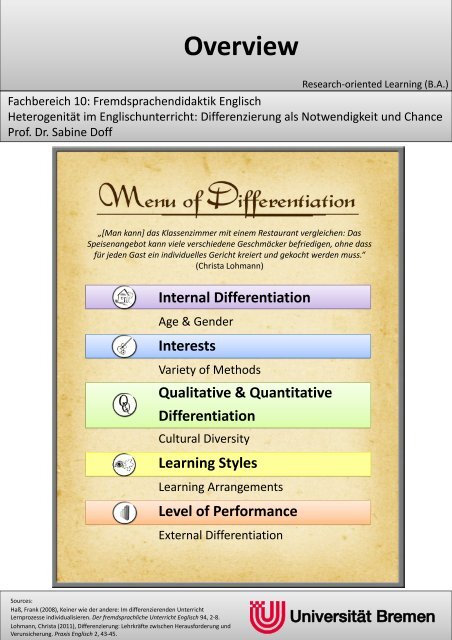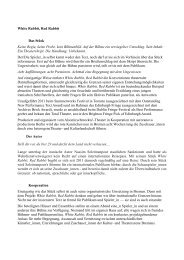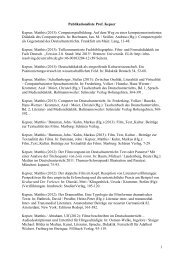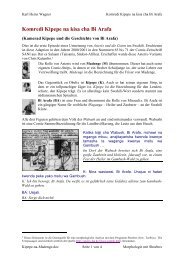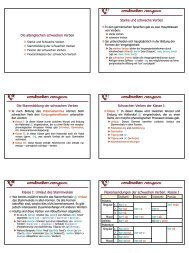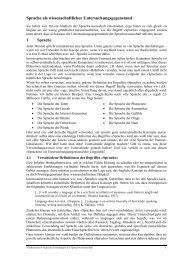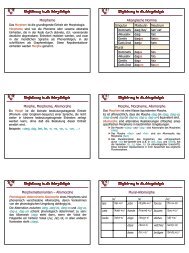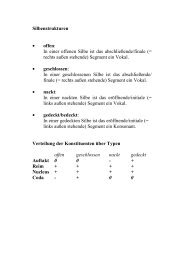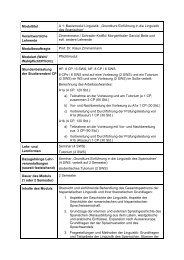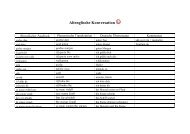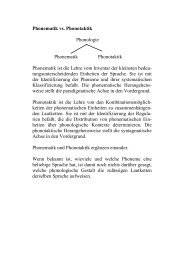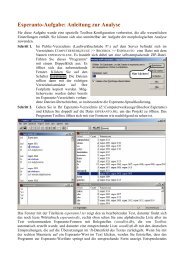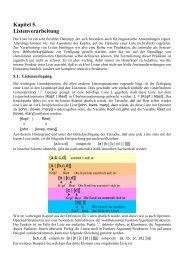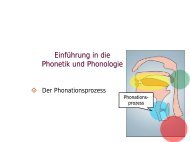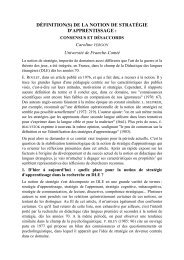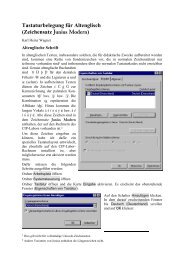Poster zusammengefasst, inkl. Lesezeichen - Fachbereich 10
Poster zusammengefasst, inkl. Lesezeichen - Fachbereich 10
Poster zusammengefasst, inkl. Lesezeichen - Fachbereich 10
You also want an ePaper? Increase the reach of your titles
YUMPU automatically turns print PDFs into web optimized ePapers that Google loves.
Overview<br />
<strong>Fachbereich</strong> <strong>10</strong>: Fremdsprachendidaktik Englisch<br />
Heterogenität im Englischunterricht: Differenzierung als Notwendigkeit und Chance<br />
Prof. Dr. Sabine Doff<br />
„[Man kann] das Klassenzimmer mit einem Restaurant vergleichen: Das<br />
Speisenangebot kann viele verschiedene Geschmäcker befriedigen, ohne dass<br />
für jeden Gast ein individuelles Gericht kreiert und gekocht werden muss.“<br />
(Christa Lohmann)<br />
Sources:<br />
Haß, Frank (2008), Keiner wie der andere: Im differenzierenden Unterricht<br />
Lernprozesse individualisieren. Der fremdsprachliche Unterricht Englisch 94, 2-8.<br />
Lohmann, Christa (2011), Differenzierung: Lehrkräfte zwischen Herausforderung und<br />
Verunsicherung. Praxis Englisch 2, 43-45.<br />
Internal Differentiation<br />
Age & Gender<br />
Interests<br />
Variety of Methods<br />
Qualitative & Quantitative<br />
Differentiation<br />
Cultural Diversity<br />
Learning Styles<br />
Learning Arrangements<br />
Level of Performance<br />
External Differentiation<br />
Research-oriented Learning (B.A.)
Icon<br />
Forms of Differentiation<br />
<strong>Fachbereich</strong> <strong>10</strong>: Fremdsprachendidaktik Englisch<br />
Heterogenität im Englischunterricht: Differenzierung als Notwendigkeit und Chance<br />
Prof. Dr. Sabine Doff<br />
Icon<br />
Internal Differentiation<br />
Internal differentiation aims at the support of each student depending on<br />
their individual way of learning. Its basic idea is to offer a variety of learning<br />
arrangements from which students can choose according to their individual<br />
needs and working techniques. For teachers, this also means to become<br />
providers rather than instructors; their main task is to make internal<br />
differentiation possible while sustaining the social cohesion of the learner<br />
group (Lohmann 2011: 43f.). Current research results, however, state that<br />
internal differentiation methods are not very common at German schools.<br />
As Trautmann and Wischer explain, teachers tend to have a negative<br />
attitude even if they are willing to use these methods in class (2011: 5f.).<br />
They criticise that internal differentiation is difficult to implement since it is<br />
too work-intensive and time-consuming.<br />
Interests<br />
The idea of creating lessons according to pupils‘ interests is based on the<br />
principle of child-centredness, which is one principle of EFL. This principle<br />
includes the idea that the development of children is not unitary, therefore<br />
students‘ interests are distinctive. Thus, teachers have to adjust the content<br />
of the lesson to each group of learners.<br />
Topics of interest are motivating if they evoke emotions, fantasy and<br />
creativity of school children. However, topics have to be authentic,<br />
meaningful and interesting for the pupils. Meaningful topics are subjects<br />
which focus on children‘s areas of interest (Böttger 20<strong>10</strong>).<br />
Sources:<br />
Böttger, Heiner (20<strong>10</strong>), Englisch lernen in der Grundschule. Bad Heilbrunn: Verlag Julius Klinkhardt.<br />
Trautmann, Matthias & Wischer, Beate (2011), Der Vielfalt mit Vielfalt begegnen. Praxis Schule 1, 4-7.<br />
Lohmann, Christa (2011), Differenzierung: Lehrkräfte zwischen Herausforderung und Verunsicherung.<br />
Praxis Englisch 2, 43-45.<br />
Research-oriented Learning (B.A.)
Icons<br />
Forms of Differentiation<br />
<strong>Fachbereich</strong> <strong>10</strong>: Fremdsprachendidaktik Englisch<br />
Heterogenität im Englischunterricht: Differenzierung als Notwendigkeit und Chance<br />
Prof. Dr. Sabine Doff<br />
Icon<br />
Qualitative Differentiation<br />
Qualitative differentiation aims at the individual ability of each pupil. In<br />
order to take these individual abilities into consideration, teachers can<br />
adapt their tasks. This means to create more complex tasks for more<br />
advanced learners and less complex tasks for the other students, while<br />
keeping the same topic for all students. The grading is traditionally as<br />
follows: production and reproduction (Lohmann 2011: 44) or reproduction,<br />
reorganisation and transfer (Haß 2008: 6). Apart from the tasks, the<br />
difficulty of texts also plays an important role: with regard to the topic, it<br />
can be easier or more difficult for students, depending on how close it is to<br />
their knowledge and experience (ibid.).<br />
Quantitative Differentiation<br />
Quantitative differentiation focuses on the length and amount of tasks and<br />
texts. Therefore, it takes the individual pace of each student into<br />
consideration (Haß 2008: 6; Lohmann 2011: 44). This might be one of the<br />
easiest and most practical possibilities to differentiate, as teachers only<br />
have to bring additional material into class for faster learners.<br />
Sources:<br />
Haß, Frank (2008), Keiner wie der andere: Im differenzierenden Unterricht<br />
Lernprozesse individualisieren. Der fremdsprachliche Unterricht Englisch 94, 2-8.<br />
Lohmann, Christa (2011), Differenzierung: Lehrkräfte zwischen Herausforderung<br />
und Verunsicherung. Praxis Englisch 2, 43-45.<br />
Research-oriented Learning (B.A.)
Icon<br />
Forms of Differentiation<br />
<strong>Fachbereich</strong> <strong>10</strong>: Fremdsprachendidaktik Englisch<br />
Heterogenität im Englischunterricht: Differenzierung als Notwendigkeit und Chance<br />
Prof. Dr. Sabine Doff<br />
Icon<br />
Learning Styles<br />
According to David Kolb’s learning theory, different people prefer different learning<br />
styles (McLeod 20<strong>10</strong>).<br />
Accommodating (doing and feeling): People with an accommodating learning<br />
Sources:<br />
McLeod, Saul (20<strong>10</strong>), David Kolb – Learning Styles [Online:<br />
http://www.simplypsychology.org/learning-kolb.html. 21.06.2012].<br />
Trautmann, Matthias & Wischer, Beate (2011), Der Vielfalt mit Vielfalt<br />
begegnen. Praxis Schule 1, 4-7.<br />
style rely on intuition (Kolb calls it ‘gut instinct’) rather than logic.<br />
Diverging (feeling and watching): People with a diverging learning style are able<br />
to look at exercises, tasks, etc. from different perspectives. This learning style is<br />
called ‘diverging’ since these people perform better in situations that require for<br />
example brainstorming.<br />
Converging (doing and thinking): People with a converging style are good at<br />
solving problems and finding solutions to practical issues. They prefer technical<br />
tasks, like to experiment with new ideas and to work with practical applications.<br />
Assimilating (watching and thinking): The approaches of a person with an<br />
assimilating learning style are logical. Thus, they organise information in a logical<br />
format.<br />
Level of Performance<br />
Differentiation according to the pupils’ individual level of performance is one<br />
of the most basic opportunities to differentiate. This kind of differentiation<br />
becomes more and more important today with regard to Gesamt- and<br />
Oberschulen, as the levels of performance are highly heterogeneous. To be<br />
able to take the individual levels into account, it is essential that teachers<br />
diagnose these levels thoroughly as otherwise the result will be that the<br />
students feel unchallenged or overtaxed. To achieve a differentiation<br />
between levels of performance, teachers need to open up the organisation of<br />
their lessons (Trautmann & Wischer 2011: 5). Furthermore, teachers can<br />
provide different learning goals for their pupils (ibid.: 6), which might lead to<br />
the creation of individual portfolios with tasks and texts according to the<br />
pupils’ level of performance.<br />
Research-oriented Learning (B.A.)
Feld-<br />
forschung<br />
Forschungsmethodik<br />
<strong>Fachbereich</strong> <strong>10</strong>: Fremdsprachendidaktik Englisch<br />
Heterogenität im Englischunterricht: Differenzierung als Notwendigkeit und Chance<br />
Prof. Dr. Sabine Doff<br />
Beobachtungsprotokoll Englischunterricht an Oberschulen jeweils zu führen für jede Stunde / Doppelstunde<br />
Klasse* Lehrkraft* Datum Studierende/r<br />
Art der Stunde / Thema: Weitere pädagogische Kraft?<br />
Klassenstunde Lernbüro<br />
45´ 90´<br />
Beobachtungskriterien (ankreuzen oder ergänzen) Kommentar (Beispiele, Arbeitsblätter, Textbeispiele etc.)<br />
Hilfe für Schwächere<br />
Wechsel ins Deutsche zur Hilfe für<br />
Schwächere<br />
Unterschiedliche Medien zur Hilfe für<br />
Schwächere<br />
Andere Hilfe<br />
Werden alle SuS mit den erteilten<br />
Aufgaben in der Phase/Std. fertig?<br />
ja nein<br />
Wahlfreiheit ja nein<br />
Zugang Hören / Lesen / Schreiben<br />
Sozialform PA / GA / individuell<br />
Wie viele Differenzierungsniveaus gebildet?<br />
In welchen Phasen<br />
findet Differenzierung<br />
statt?<br />
Woher kommt das<br />
Material zur<br />
Differenzierung?<br />
Welche Art von<br />
Lernstandkontrollen?<br />
Aufgabenstellung <br />
Durchführung<br />
Lehrwerk And.<br />
Lehrwerk<br />
Bewertung<br />
Klassenarbeit Test Präsentation<br />
Internet Selbst<br />
erstellt<br />
Portfolio<br />
Von<br />
Kollegen<br />
Sonstige<br />
Fragebogen 12 Lehrkräfte<br />
Beobachtungsbogen Jahrgänge 5,6,7<br />
Umfang der Beobachtungen 85 Stunden<br />
Mündliche Aufgaben – differenziert nach<br />
Inhalt: verschieden gleich<br />
Umfang: mehr weniger<br />
Schwierigkeitsgrad: schwieriger leichter<br />
Zeit: vorgegeben individuelle<br />
Sozialform: Einzelarbeit Partnerarbeit Gruppenarbeit<br />
Koop. Lernformen<br />
Schriftliche Aufgaben – differenziert nach<br />
Inhalt: verschieden gleich<br />
Umfang: mehr weniger<br />
Schwierigkeitsgrad: schwieriger leichter<br />
Zeit: vorgegeben individuelle<br />
Sozialform Einzelarbeit Partnerarbeit<br />
Koop. Lernformen<br />
Interaktion ja nein<br />
Interaktionen SuS Partner / Gruppe<br />
Interaktionen LuS<br />
Kooperative Lernformen<br />
Eigene / neue Beobachtungskriterien bzw. -schwerpunkte<br />
<br />
Angeschriebene Schulen: 27 Rücklauf: 5<br />
Die Unterrichtsbeobachtung wurden insgesamt von 9<br />
Studierenden (M.Ed) in 5 Oberschulen durchgeführt.<br />
Research-oriented Learning (M.ed.)
Forschungs-<br />
frage<br />
Auszüge aus<br />
den<br />
Ergebnissen<br />
des<br />
Fragebogens<br />
Fazit<br />
Zufriedenheit und Wünsche<br />
<strong>Fachbereich</strong> <strong>10</strong>: Fremdsprachendidaktik Englisch<br />
Heterogenität im Englischunterricht: Differenzierung als Notwendigkeit und Chance<br />
Prof. Dr. Sabine Doff<br />
Marleena Schulz<br />
Christian Agnischock<br />
Wie zufrieden sind Englischlehrkräfte an Bremer<br />
Oberschulen mit den Resultaten von und<br />
Unterstützungsangeboten zu Differenzierung und<br />
welche Wünsche resultieren gegebenenfalls daraus?<br />
Einschätzung des Weiterbildungsangebotes: 2,66 (von 4) ≙ eher schlecht<br />
Zufriedenheit mit Differenzierungsmaßnahmen: 2,46 (von 4) ≙ eher zufrieden<br />
Begründung der Zufriedenheit der Differenzierungsmaßnahmen:<br />
POSITIV NEGATIV<br />
SuS seien durch Lernerfolge glücklicher<br />
oder motivierter<br />
Momentan: hoher Arbeitsmehraufwand und Kontrolle notwendig<br />
Zukünftig: besseres Material- und Ausbildungsangebot → weniger<br />
Arbeitsmehraufwand und selbständiges Arbeiten?<br />
Wunsch nach mehr Unterstützung:<br />
zusätzliche zweite Lehrkraft oder pädagogisches Personal<br />
besseres vorgefertigtes differenzierendes Unterrichtsmaterial entweder<br />
käuflich zu erwerben oder Zeit um es selbst erstellen zu können<br />
Fortbildungen von Verlagen, auf denen man lernt, wie man mit den<br />
vorhandenen Lehrwerken differenzieren kann<br />
Planstunden für „work plans“ oder flexiblere Stundenpläne mit Freizeit<br />
spezielle Unterrichtsräume zur Differenzierung<br />
langsamere SuS wollen ebenfalls die<br />
Arbeitsblätter für Schnellere bearbeiten<br />
bevor sie den vorherigen Arbeitsauftrag<br />
beendet haben<br />
SuS helfen sich gegenseitig Vorbereitungsaufwand der LuL stehe<br />
Work Plans funktionieren bei guter<br />
Planung<br />
Research-oriented Learning (M.ed.)<br />
nicht im gewünschten Verhältnis zum<br />
Differenzierungserfolg<br />
Work Plans funktionieren nur bei<br />
genauer Kontrolle und müssen den SuS<br />
erst vertraut sein<br />
Gute Ergebnisse bei Leistungskontrollen Selbstständiges Arbeiten falle schwer
Asifa Manzoor Gill<br />
Julian Breen<br />
Herausforderung<br />
<strong>Fachbereich</strong> <strong>10</strong>: Fremdsprachendidaktik Englisch<br />
Heterogenität im Englischunterricht: Differenzierung als Notwendigkeit und Chance<br />
Prof. Dr. Sabine Doff<br />
Forschungs-<br />
frage<br />
Auszüge aus<br />
den<br />
Ergebnissen<br />
des<br />
Fragebogens<br />
Fazit<br />
In welcher Hinsicht fordert die<br />
Heterogenität die Englischlehrkräfte<br />
besonders heraus?<br />
Organisation<br />
Mehr Personal (Team-Teaching, Sonderpädagogen)<br />
Kleinere Klassen<br />
Hoher Grad von Kooperation zwischen Lehrer/innen<br />
und Schulen<br />
Zu große<br />
Klassen<br />
Jede/n SuS<br />
individuell<br />
betreuen<br />
Diff.<br />
Lernniveaus<br />
für LuL und<br />
SuS<br />
ANFORDERUNGEN<br />
Inklusions-<br />
SuS<br />
Sehr hoher<br />
Arbeitsaufwand<br />
Wenig<br />
Übungszeit<br />
für SuS<br />
Unterrichtsreduktion zum Erstellen von Arbeitsmaterialien<br />
Praktische Fortbildungen zur Differenzierung<br />
Research-oriented Learning (M.ed.)<br />
Fehlende<br />
Grundkenntnisse<br />
der SuS
Forschungs-<br />
frage<br />
Auszüge aus<br />
den<br />
Ergebnissen<br />
des<br />
Fragebogens<br />
Fazit<br />
Unterstützung<br />
<strong>Fachbereich</strong> <strong>10</strong>: Fremdsprachendidaktik Englisch<br />
Heterogenität im Englischunterricht: Differenzierung als Notwendigkeit und Chance<br />
Prof. Dr. Sabine Doff<br />
Vanessa Braje<br />
Luisa Wiesenbach<br />
Inwieweit erhalten Englischlehrkräfte an den Bremer<br />
Oberschulen Unterstützung im Hinblick auf die<br />
Herausforderung der Differenzierung?<br />
Wahrgenomme<br />
Weiterbildungsmaßnahmen:<br />
Vom LIS<br />
Von Schulbuchverlagen<br />
Von der Uni Bremen<br />
LW = Lehrwerk<br />
35<br />
30<br />
25<br />
20<br />
15<br />
<strong>10</strong><br />
5<br />
0<br />
Vorhandene Weiterbildungsmaßnahmen teilweise qualitativ nicht gut<br />
beurteilt<br />
Material<br />
Aus Lehrersicht größtes Problem der Zeitfaktor (differenziertes Material<br />
kaum vorhanden; muss häufig selber erstellt werden)<br />
Zusätzliches Personal würde Differenzierung unterstützen, ist aber<br />
momentan nicht gegeben<br />
Weiterbildung<br />
Häufigkeit<br />
Research-oriented Learning (M.ed.)<br />
Einschätzung der<br />
Weiterbildungsmaßnahmen<br />
eher gut<br />
eher schlecht<br />
schlecht<br />
Zusätzliches<br />
Pädagogisches<br />
Fachpersonal<br />
In Regelklassen:<br />
Grundsätzlich keine zusätzlichen<br />
Fachkräfte (Ausnahme: einmal 1<br />
Std./Woche Doppelbesetzung)<br />
In Inklusionsklassen:<br />
Zusätzlich Sonderpädagogen
Forschungs-<br />
frage<br />
Auszüge aus<br />
den<br />
Ergebnissen<br />
des<br />
Fragebogens<br />
Fazit<br />
Differenzierungsbedarf<br />
<strong>Fachbereich</strong> <strong>10</strong>: Fremdsprachendidaktik Englisch<br />
Heterogenität im Englischunterricht: Differenzierung als Notwendigkeit und Chance<br />
Prof. Dr. Sabine Doff<br />
Friederike Beins<br />
Irina Woodard<br />
Wie groß ist der Differenzierungsbedarf an Bremer<br />
Oberschulen?<br />
9<br />
8<br />
7<br />
6<br />
5<br />
4<br />
3<br />
2<br />
1<br />
0<br />
Einschätzung der Lehrkräfte<br />
zur Heterogenität der<br />
Lerngruppen<br />
Differenzierungsnotwendigkeit als<br />
hoch eingeschätzt<br />
Begründungen variieren von<br />
zur Vermeidung von<br />
Langeweile für stärkere<br />
Schüler<br />
Individuelle Zuwendung<br />
wird dadurch ermöglicht<br />
Keine Differenzierung<br />
beeinträchtigt Lernerfolg<br />
Schaffung eines besseren<br />
Klassenklimas<br />
Der Differenzierungsbedarf ist unbestritten, ihre Anwendung ist bereits<br />
tägliche Praxis. Ideen und Austausch zum Thema werden die Lernlandschaft<br />
weiterhin nachhaltig beeinflussen und bestimmen.<br />
12<br />
<strong>10</strong><br />
8<br />
6<br />
4<br />
2<br />
0<br />
Research-oriented Learning (M.ed.)<br />
grundsätzlich wird ab Klasse 7 in<br />
zwei Lernniveaus eingeteilt<br />
allerdings Wahrnehmung mehrer<br />
Lernlevels<br />
teilweise werden nach<br />
individueller Notwendigkeit<br />
weitere Niveaustufen angewandt<br />
bzw. entwickelt<br />
Bedeutungseinschätzung der<br />
Differenzierung durch<br />
Lehrkräfte
Forschungs-<br />
frage <br />
Zusammen-<br />
fassung<br />
der<br />
Ergebnisse<br />
Fazit<br />
Differenzierungsmöglichkeiten<br />
<strong>Fachbereich</strong> <strong>10</strong>: Fremdsprachendidaktik Englisch<br />
Heterogenität im Englischunterricht: Differenzierung als Notwendigkeit und Chance<br />
Prof. Dr. Sabine Doff<br />
Gesa Braue<br />
Wie findet Differenzierung an Bremer<br />
Oberschulen statt?<br />
Differenzierung wird<br />
unterschiedlich betrieben:<br />
1. Unterrichtsmaterial<br />
Lehrbücher für differenzierte<br />
Schulformen<br />
Selbst erstelltes Material<br />
2. Qualitativ und Quantitativ<br />
Umfang/Art der Aufgaben<br />
Zeitvorgaben<br />
Schwierigkeitsgrade der<br />
Arbeitsaufgaben:<br />
Multiple-Choice<br />
Äußere Rahmenbedingungen verunsichern kompetente<br />
Lehrkräfte.<br />
vs.<br />
Selbstformulierung<br />
Klassenarbeiten/Tests: Grund-<br />
und Erweiterungsniveau<br />
Daraus ergibt sich die Frage:<br />
Research-oriented Learning (M.ed.)<br />
Umfang<br />
Material<br />
Schwierig<br />
-keit<br />
Differenzierung<br />
Wie stellt sich die Schulbehörde Differenzierung genau vor?
Icon<br />
<strong>Fachbereich</strong> <strong>10</strong>: Fremdsprachendidaktik Englisch<br />
What?<br />
How?<br />
Analysis<br />
Conclusion<br />
(and<br />
Suggestions)<br />
Work in progress<br />
Bachelor thesis on:<br />
Multiple Intelligences<br />
Heterogenität im Englischunterricht: Differenzierung als Notwendigkeit und Chance<br />
Prof. Dr. Sabine Doff<br />
How can picture books be used in a differentiated<br />
way in Primary Schools’ English lessons?<br />
Examination of the topics Differentiation and Picture<br />
Books, analysis of Froggy Gets Dressed<br />
Creation of follow-up tasks, addressing the children‘s<br />
multiple intelligences<br />
London, Jonathan(1994). Froggy Gets Dressed. Reprint. New York et. al.: Puffin Books.<br />
Pictures via KizClub [Online: http://kizclub.com/storypatterns/froggy.pdf<br />
25.06.2012].<br />
A task for the bodily-<br />
kinesthetic intelligence:<br />
A magnetic Froggy gets<br />
dressed by the students<br />
with aid of modified<br />
sentences taken from the<br />
story, e.g.<br />
Froggy puts on his hat.<br />
He tugs on his<br />
mittens.<br />
Picture books offer diverse opportunities for differentiated<br />
teaching in Primary Schools. Teaching a language by<br />
considering multiple intelligences, value can be attached to<br />
diverse aptitudes.<br />
Jessica Spalek
Work in progress<br />
Bachelor thesis on:<br />
Differentiation with course books in English lessons<br />
f<br />
<strong>Fachbereich</strong> <strong>10</strong>: Fremdsprachendidaktik Englisch<br />
What?<br />
How?<br />
Analysis<br />
Conclusion<br />
of year 7<br />
Heterogenität im Englischunterricht: Differenzierung als Notwendigkeit und Chance<br />
Prof. Dr. Sabine Doff<br />
Which opportunities and limitations do the course books<br />
Notting Hill Gate 3 and English G 21 D3 offer for differentiation<br />
in English lessons of year 7?<br />
Course book analysis<br />
Comparison of the course books regarding differentiated<br />
tasks and exercises including:<br />
differentiation by learning styles<br />
differentiation by methods<br />
differentiation by level of performance<br />
examples:<br />
Example: Writing a holiday postcard<br />
These two exercises are<br />
differentiated by level of<br />
performance. Exercise c aims at<br />
Pupils of a lower level and provides<br />
them with written sentences where<br />
only one word is missing. As an<br />
additional help, the missing words<br />
are replaced by pictures. Exercise d<br />
only contains certain parts of<br />
sentences and the pupils have to<br />
complete them. The sentences are<br />
much more complex than those in<br />
exercise c. Further task d requires<br />
more knowledge of the<br />
characteristics of writing a postcard.<br />
Both course books try to support teachers in differentiating<br />
their lessons. Nevertheless, it seems impossible that one<br />
course book could fulfil the demands of all pupils in a mixed<br />
ability classroom.<br />
Edelhoff, Christoph (2008), Notting Hill Gate 3B, Textbook (Schülerbuch).Braunschweig: Diesterweg.<br />
Schwarz, Hellmut (2007), English G 21, Band D3, Grundausgabe (Schülerbuch). Berlin: Cornelsen.<br />
Examples taken from:<br />
English G 21<br />
Fatou Julia N‘Jie
Icon<br />
<strong>Fachbereich</strong> <strong>10</strong>: Fremdsprachendidaktik Englisch<br />
What?<br />
How?<br />
Analysis<br />
Hypotheses<br />
Work in progress<br />
Master thesis on:<br />
Differentiation through teaching materials<br />
Heterogenität im Englischunterricht: Differenzierung als Notwendigkeit und Chance<br />
Prof. Dr. Sabine Doff<br />
Which teaching materials are used for<br />
differentiation in the classroom?<br />
Classroom observations<br />
Primary schools<br />
3rd and 4th grade<br />
Extract of the observation sheet:<br />
Bereich Maßnahme Wird<br />
Aufgaben Mehr Aufgaben für<br />
Fast learners simply get extra exercises.<br />
The preparation of tasks with different levels of<br />
Sources:<br />
Haß, Frank (2008), Individualisierung von A-Z. Der Fremdsprachliche<br />
Unterricht Englisch 94, 9.<br />
difficulty or different achievement levels is too time<br />
consuming.<br />
schnellere Lerner<br />
Differenzierte<br />
Anforderungen<br />
Inhaltliche<br />
Differenzierung der<br />
Aufgaben<br />
Unterschiedliche<br />
Hilfsmittel<br />
angeboten<br />
Wird nicht<br />
angeboten<br />
Anmerkungen<br />
Manka Schaz
<strong>Fachbereich</strong> <strong>10</strong>: Fremdsprachendidaktik Englisch<br />
What?<br />
How?<br />
Analysis<br />
Conclusion<br />
and<br />
Suggestions<br />
Interests<br />
Heterogenität im Englischunterricht: Differenzierung als Notwendigkeit und Chance<br />
Prof. Dr. Sabine Doff<br />
Sources:<br />
How far should the lesson content differentiate by pupils’<br />
interests in order to create an intrinsic motivational<br />
atmosphere in the classroom?<br />
Observation of a primary school class and teacher interview<br />
Survey among the pupils what they are interested in<br />
Examination of class material<br />
Personal teaching experience<br />
Literature research<br />
Interest Fostering Teaching Material that could be used:<br />
Authentic picture books include language-, literature-didactic<br />
Practical Observations and Personal Experience<br />
Positive Negative<br />
Creative, individual teaching<br />
material<br />
Survey among students what<br />
they are interested in<br />
Interesting and authentic teaching material can motivate<br />
children. Thus, teachers should not only rely on the course<br />
book but use additional material according to their students’<br />
interests.<br />
Böttger, Heiner (20<strong>10</strong>), Englisch lernen in der Grundschule. Bad Heilbrunn: Verlag Julius Klinkhardt, 65-79.<br />
Coyle, Yvette et al. (2002), Teaching English to children – Interactivity and Teaching Strategies in the Primary FL Classroom. Frankfurt am Main: Peter Lang Europäischer Verlag der Wissenschaften, 41.<br />
Hogh, Edda (2003), Storytelling in der Grundschule. In: Edelhoff, Christoph (Hrsg.) (2003), Englisch in der Grundschule und darüber hinaus. Frankfurt am Main: Verlag Moritz Diesterweg, 40f.<br />
Jüngst, Pat (2003), Games, Rhymes and Activities in the Classroom. In: Edelhoff, Christoph (Hrsg.) (2003), Englisch in der Grundschule und darüber hinaus. Frankfurt am Main: Verlag Moritz Diesterweg, 71f.<br />
Niemann, Heide (2002), Mit Bilderbüchern Englisch lernen. Seelze-Velber: Kallmeyersche Verlagsbuchhandlung GmbH, 15.<br />
Roberts, John (2003), Lieder und Musik im Englischunterricht der Grundschule. In: Edelhoff, Christoph (Hrsg.) (2003), Englisch in der Grundschule und darüber hinaus. Frankfurt am Main: Verlag Moritz<br />
Diesterweg, 60f.<br />
and intercultural and general pedagogical learning aims<br />
Language games motivate and develop social skills<br />
Chanting rhymes and dancing games movement increases<br />
coordination<br />
Research-oriented Learning (B.A.)<br />
Songs concentration on auditory, visual and kinaesthetic<br />
ways of input; give access to authentic texts and topics<br />
Dominance of the course<br />
book Playway (contains<br />
mainly non-authentic and<br />
non-diverse material)
Icon Internal Differentiation<br />
<strong>Fachbereich</strong> <strong>10</strong>: Fremdsprachendidaktik Englisch<br />
Heterogenität im Englischunterricht: Differenzierung als Notwendigkeit und Chance<br />
Prof. Dr. Sabine Doff<br />
What?<br />
How?<br />
Analysis<br />
Conclusion<br />
(and<br />
Suggestions)<br />
Sources:<br />
Freie Hansestadt Bremen (2011), Stadtteilbericht Huchting. Bremen: Freie Hansestadt Bremen [Online:<br />
http://stadtentwicklung.bremen.de/sixcms/media.php/13/201<strong>10</strong>121StadtteilberichtHuchting_EndfassungBild.PDF. <strong>10</strong>.06.2012]<br />
Freie Hansestadt Bremen (20<strong>10</strong>), Stadtteilbericht Obervieland. Bremen: Freie Hansestadt Bremen [Online:<br />
http://stadtentwicklung.bremen.de/sixcms/media.php/13/StadtteilberichtObervielandEndfassungBild.PDF. <strong>10</strong>.06.2012]<br />
Freie Hansestadt Bremen (20<strong>10</strong>), Stadtteilbericht Gröpelingen. Bremen: Freie Hansestadt Bremen [Online:<br />
http://stadtentwicklung.bremen.de/sixcms/media.php/13/Stadtteilbericht_Groepelingen_Endfassung.PDF. <strong>10</strong>.06.2012]<br />
Fig. 1: http://wiki-commons.genealogy.net/images/f/f6/Bezirke_Stadt_Bremen.png. <strong>10</strong>.06.2012<br />
Which preconditions at Bremen schools allow<br />
interior differentiation?<br />
Observation of three selected schools in Bremen<br />
(districts: Gröpelingen, Huchting, Obervieland)<br />
fig. 1: Bremen districts<br />
Background Information<br />
Unemployment rate:<br />
Gröpelingen: 23,4%<br />
Huchting: 17,0%<br />
Obervieland: 12,9%<br />
Migration rate:<br />
Gröpelingen: 40,7%<br />
Huchting: 34,5%<br />
Obervieland: 28,3%<br />
Preconditions for Internal Differentiation Level of Availability<br />
availability of rooms for differentiation<br />
(in order to make individual learning possible)<br />
free (teaching) materials<br />
(such as coloured pens, writing material, material for arts and craft)<br />
media equipment:<br />
(availability of appropriate black- or whiteboards, overhead<br />
projectors in all classrooms; availability of PCs and projectors;<br />
Internet access)<br />
Research-oriented Learning (B.A.)<br />
not implemented<br />
not implemented<br />
partly implemented<br />
(main problems: not enough PCs /<br />
no Internet access)<br />
Many preconditions for internal differentiation are missing at Bremen schools. This makes internal<br />
differentiation more difficult and time-consuming.<br />
Suggestions: equipping schools with…<br />
...additional rooms so that students have enough space to learn with individual learning plans;<br />
...(more) new media such as TV sets, PCs and projectors; free and constant Internet access;<br />
...more material for both teachers and students in order to enable teachers to work with internal<br />
differentiation methods
Icon<br />
<strong>Fachbereich</strong> <strong>10</strong>: Fremdsprachendidaktik Englisch<br />
What?<br />
How?<br />
Analysis<br />
Conclusion<br />
Learning Styles<br />
(Primary School)<br />
Heterogenität im Englischunterricht: Differenzierung als Notwendigkeit und Chance<br />
Prof. Dr. Sabine Doff<br />
Which opportunities for differentiation between<br />
learning styles does the course book Playway 3<br />
offer?<br />
Analysis of course book and teachers’ handbook<br />
Primary school<br />
Playway 3 (grade 3)<br />
Lesson<br />
segment<br />
Introduce<br />
new<br />
vocabulary<br />
Introduce<br />
the writing<br />
of the new<br />
vocabulary<br />
Do the<br />
chant<br />
Benefit: Playway aims at different learning styles.<br />
Potential problem: overwhelming the children by<br />
Gerngross, Günter & Puchta, Herbert (2007), Playway 3 Pupil‘s Book. Stuttgart:<br />
Klett.<br />
Gerngross, Günter & Puchta, Herbert (2007), Playway 3 Teacher‘s Book. Stuttgart:<br />
Klett.<br />
Opportunities for<br />
differentiation<br />
picture cards, real objects,<br />
listening, repeating,<br />
pointing<br />
assign words to pictures,<br />
find missing words,<br />
teacher comments on<br />
differences between<br />
writing and pronunciation<br />
Play CD, show moves, do<br />
the moves, sing, speak,<br />
point to words<br />
Research-oriented Learning (B.A.)<br />
having them ‘eat through the whole menu’.
<strong>Fachbereich</strong> <strong>10</strong>: Fremdsprachendidaktik Englisch<br />
What?<br />
How?<br />
Analysis<br />
Conclusion<br />
Learning Styles<br />
Heterogenität im Englischunterricht: Differenzierung als Notwendigkeit und Chance<br />
Prof. Dr. Sabine Doff<br />
Haß, Frank (2006), Orange Line 2. Stuttgart: Klett.<br />
McLeod, Saul (20<strong>10</strong>), David Kolb – Learning Styles [Online:<br />
http://www.simplypsychology.org/learning-kolb.html. 21.06.2012].<br />
With which material can teachers live up to existing<br />
heterogeneity in class, based on different learning<br />
styles?<br />
Analysis of Orange Line 2<br />
Grade 6<br />
Comprehensive school (Gesamtschule)<br />
Active<br />
Experimentation<br />
Doing<br />
Orange Line 2 provides material that…<br />
… takes children‘s individual qualification and abilities into<br />
account<br />
Learning<br />
Styles<br />
Concrete Experience<br />
Feeling<br />
Accomodating Diverging<br />
Converging Assimilating<br />
Abstract<br />
Conceptualisation<br />
Thinking<br />
Research-oriented Learning (B.A.)<br />
… gives opportunities to children to learn individually<br />
Reflective<br />
Observation<br />
Watching
<strong>Fachbereich</strong> <strong>10</strong>: Fremdsprachendidaktik Englisch<br />
What?<br />
How?<br />
Analysis<br />
Conclusion<br />
Level of performance<br />
Heterogenität im Englischunterricht: Differenzierung als Notwendigkeit und Chance<br />
Prof. Dr. Sabine Doff<br />
Which opportunities for qualitative differentiation<br />
does the course book Notting Hill Gate offer?<br />
Analysis of the course book Notting Hill Gate 3 (A/B)<br />
Grade 7<br />
Comprehensive school (Gesamtschule)<br />
The exercises offer a differentiation on two levels: A and B<br />
Moreover: icons which symbolize<br />
the degree of difficulty<br />
Star: lower level of difficulty<br />
Sun: higher level of difficulty<br />
The course book offers a variety of exercises for different levels of<br />
performance<br />
Teacher has to decide which level is appropriate for the students<br />
Difficulty of classifying the students<br />
Edelhoff, Christoph (Hrsg.) (2007), Notting Hill Gate 3 (A/B). Braunschweig: Diesterweg.<br />
A-level (Erweiterungskurs) B-level (Grundkurs)<br />
For students with a higher level of<br />
performance<br />
For students with a lower level of<br />
performance<br />
Complex exercises Complex exercises are divided into easy<br />
Additional (optional) tasks<br />
Projects at the end of each unit (also<br />
optional)<br />
In addition: a higher amount of<br />
vocabulary<br />
and motivating units<br />
An easier access to the exercises is<br />
ensured by short sentences, a small<br />
amount of idioms and simplified syntax<br />
In addition: smaller amount of<br />
vocabulary<br />
Research-oriented Learning (B.A.)
<strong>Fachbereich</strong> <strong>10</strong>: Fremdsprachendidaktik Englisch<br />
What?<br />
How?<br />
Analysis<br />
Conclusion<br />
Quantitative Differentiation<br />
Heterogenität im Englischunterricht: Differenzierung als Notwendigkeit und Chance<br />
Prof. Dr. Sabine Doff<br />
Sources:<br />
How do textbook publishers adapt their books to ensure<br />
differentiation between learner levels?<br />
Analysis of the three versions of the<br />
course book English G 21<br />
GYM – Gymnasium (advanced level)<br />
ERW – Erweiterte Ausgabe für Oberschulen<br />
(medium level)<br />
GR – Grundausgaben für Oberschulen (basic<br />
level)<br />
Example: Post-Reading Exercises<br />
-GYM-<br />
Write Tim’s next postcard<br />
back to his parents.<br />
Summary of analysis:<br />
Lohmann, Christa (2001), Differenzierung. Lehrkräfte zwischen Herausforderung und Verunsicherung. Praxis Englisch 5:2, 43-45.<br />
Schwarz, Helmut (2007), English G21. Class 7 textbook. Berlin: Cornelsen.<br />
Tillmann, Klaus Jürgen (2007), Kann man in heterogenen Lerngruppen alle Schülerinnen und Schüler fördern? Der Blick der Bildungsforschung in das<br />
Regelschulsystem. Vortrag auf dem Symposion des VdS auf der DIDACTA am 1.3.2007 in Köln [Online: http://bildungsserver.berlinbrandenburg.de/fileadmin/bbb/schulqualitaet/lehren_und_lernen/schulanfang/tillmann07heterogenitaet_selektion_auch_GSOR071230__1_.pdf.<br />
23.6.2012].<br />
Wilson, Jacqueline (1995), Cliffhanger. London: Corgi.<br />
-ERW-<br />
Analysed part of the book:<br />
The story “Tim goes abseiling” or “Tim, a rock<br />
and a rope” in G 21 A&D 3 – 7 th grade Unit 3,<br />
which is based on Jacqueline Wilson’s<br />
Cliffhanger, a novel for young readers (3 rd<br />
grade) and native speakers of English<br />
-GR-<br />
Pre-Reading: Reading: Post-Reading:<br />
GYM<br />
no support, reflective task before<br />
reading<br />
ERW and GR<br />
added visual and textual support<br />
GYM and ERW<br />
offer the same adaption of the<br />
original text<br />
ERW and GR<br />
added textual and visual support<br />
GYM<br />
only one task, no further support<br />
ERW and GR<br />
added visual and textual support<br />
On a text-basis GYM and ERW are nearly identical, on a task basis ERW and GR<br />
are more alike.<br />
The different levels are mainly achieved by a reduction of tasks and supporting<br />
material.<br />
Thus, the differentiation is more quantitative than qualitative.<br />
Research-oriented Learning (B.A.)


